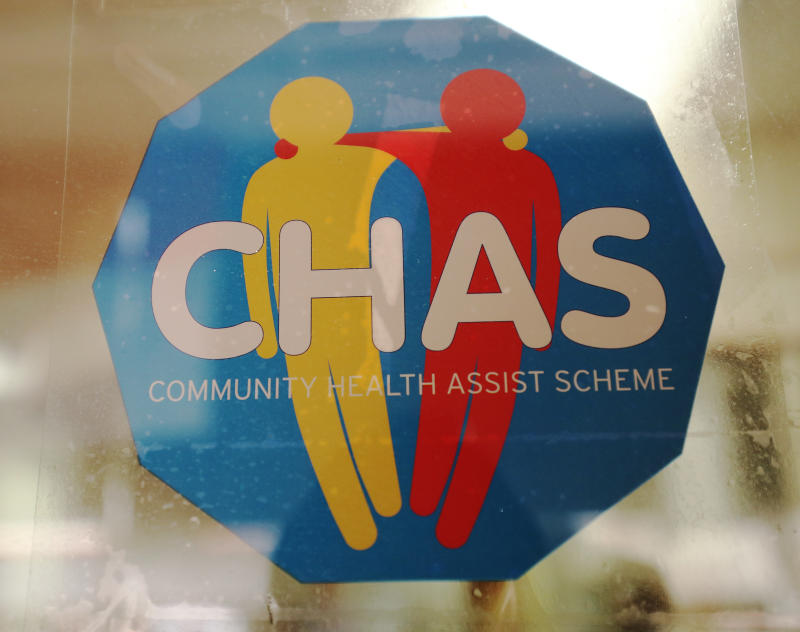Chas subsidies for about 7,700 people miscalculated due to IT error: MOH
Sign up now: Get ST's newsletters delivered to your inbox

This figure makes up about 17 per cent of people who made applications and renewals from Sept 18 to Oct 10 last year.
PHOTO: LIANHE ZAOBAO
SINGAPORE - About 7,700 people who applied for and renewed their Community Health Assist Scheme (Chas) cards in September and October last year received inaccurate healthcare subsidies due to a computer system error.
The Ministry of Health (MOH) said in a statement on Saturday (Feb 16) that the computer system, administered by IT firm NCS, had miscalculated the means-test results of these 7,700 individuals.
This figure makes up about 17 per cent of people who made applications and renewals from Sept 18 to Oct 10 last year.
The bungle was due to an "isolated case of human error", said NCS, resulting in an incorrect version of a software being deployed during a system migration.
MOH said that the means-test and subsidy tiers for the affected individuals have been corrected by Saturday. Those affected are not required to take any action for now.
About 1,300 individuals received lower subsidies due to the error. This group will have the difference reimbursed to them, MOH said. The total amount is estimated to be about $400,000.
Another 6,400 individuals received higher subsidies but will not have to return the additional subsidies disbursed, the ministry added. An MOH spokesman said that the total amount for this group is estimated to be about $2 million.
"MOH intends to recover from NCS the costs and expenses incurred as a result of this incident, as allowed for under our contract," the spokesman added.
The means-test system calculates the healthcare subsidies that individuals are eligible for based on their income information. Healthcare subsidies are means-tested so that those from lower-income households will receive greater financial support.
-
HOW THE ERROR UNFOLDED
Sept 16, 2018: IT firm NCS, when migrating the means-test system, which calculates how much subsidy a patient gets, to another government data centre, uses the wrong version of a software file.
Sept 24: The first means-test discrepancy is detected by the Community Health Assist Scheme (Chas) processing team. It reports this to NCS, which begins investigations.
Oct 10: NCS team yet to pinpoint cause of the discrepancy. But it also investigates an unrelated slow performance issue, which is also due to the software version being wrong. The software version is fixed.
Oct 9 to Nov 2: Five more cases of inaccurate means-test results are detected. NCS confirms on Nov 29 this is down to the software version issue. While means testing operates correctly after the Oct 10 fix, results that were compromised from Sept 18 to Oct 10 have yet to be corrected. The Ministry of Health (MOH) is informed.
Nov 29 to Dec 5: MOH and NCS assess the impact of the errors and find that thousands of individuals are affected.
Jan 14, 2019: The correct subsidy tiers are given to MOH.
Jan 18: MOH and NCS correct the means-test results for individuals whose incorrect records have not been used by non-Chas schemes. This helps to contain the impact.
Feb 10: The number of unique individuals is determined.
Feb 16: Correct subsidy levels for all affected individuals are restored. The authorities begin contacting those affected, and arrange for reimbursements.
SOURCE: MOH, NCS
MOH said that it first detected a discrepancy in the means-test results of a Chas card holder on Sept 24 last year.
The Chas processing team alerted NCS immediately, but the issue was initially attributed to intermittent network connection problems.
Between Oct 9 and Nov 2 last year, five more cases were detected. A more thorough investigation was launched.
In November, NCS traced the cause of the discrepancies to a software version issue on a server used by the means-test system. This happened when the system was migrated to another government data centre in September.
Hence, the means-test results were computed without the requisite income information, MOH said.
NCS also found that its deployment team had, in fact, fixed the software version issue earlier on Oct 10 last year, in response to an unrelated slow performance issue.
This prevented further cases of errors from happening, but failed to correct the means-test results generated from Sept 18 to Oct 10.
NCS deputy chief executive Ng Kuo Pin said the firm has tightened its system deployment processes, including putting in additional safeguards to prevent any recurrence.
"As a vendor, we are accountable to MOH, our client, and we regret the error and inconvenience caused to our fellow Singaporeans," Mr Ng said.
Since December, MOH has worked with NCS to establish the extent of the impact of the error.
It has also determined the correct subsidy tiers for each individual under the different services and schemes.
MOH said that its final assessment was completed on Jan 14.
The ministry will now work with grant scheme administrators and healthcare institutions to finalise the remedial actions plans, including how affected individuals are to be informed and reimbursed.
Service providers and scheme administrators will progressively inform affected individuals and arrange reimbursements where applicable, with this process to be completed by mid-March.
The ministry added that it takes a serious view of the incident and has worked with NCS on appropriate remedial measures.
It will also be working with NCS on measures to prevent such errors in the future.
Currently, Chas subsidises outpatient medical and dental treatments for lower- to middle-income citizen households and the Pioneer Generation, which refers to Singaporeans who were aged 16 and older in 1965.
At last year's National Day Rally, Prime Minister Lee Hsien Loong announced that Chas will be expanded to all Singaporeans with chronic ailments to provide tiered benefits according to a patient's income level. Details of the expanded Chas will be provided this year.


